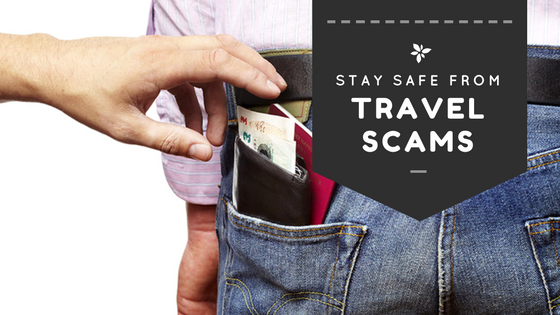
Scammers exist everywhere in the world, and they can strike when you least expect it. When you’re traveling, however, you’re particularly vulnerable to scams, because you’re often looking to those around you to cue you in to how you should act. You might not even speak the language, so it’s harder to communicate and read the people you interact with on the street, and scammers know it. They specifically look for travelers who seem lost, confused, or likely to fall for one of their tricks and zero in on your vulnerabilities (see my blog about how to avoid looking like a tourist when you’re abroad).
Not only are you more likely to get scammed when you’re traveling, but it will also probably be a bigger inconvenience. You likely only have a set amount of money with you, and it’s much harder to call upon your support network or backup funds when you’re thousands of miles from home. And, of course, if your passport is stolen you’ll find yourself in an expensive, time-consuming bureaucratic mess.
All the more reason to make sure that you stay one step ahead of the scammers!
Be wary of fake officials. In many countries, scammers dress as police officers, train conductors, and other officials in order to extract unnecessary fees from you or steal your valuables. These scams rely on the intimidation factor, and they know that you are afraid to cause trouble when you aren’t familiar with the laws and policies. Always ask to see identification, and use your common sense about whether the scenario is a believable one. There aren’t many reasons why a legitimate police officer would ask you to hand over your wallet or passport in the street, for instance.
If possible, hold them accountable to a higher authority. For instance, you can ask to speak to their supervisor, or tell a suspect police officer that you’ll be happy to accompany them to the police station to review your documents. If it’s a scam, they’ll likely insist that you don’t involve the real authorities, or they’ll balk at the suggestion.
The best protection against scams of any kind is preparation and prevention. Make sure you know the approximate price of the services you’ll need, and don’t accept anything that varies significantly. If you didn’t research in advance, your hotel concierge can probably tell you what to expect.
Stick to services that you sought out yourself. Don’t trust anyone who appears to offer you a great deal — anything that sounds too good to be true probably is. This includes small services and kindnesses, such as helping you lift your bags on public transport or clean off your clothes when something was spilled on them (this is a common scam!). If you really do need help, pick someone and ask them yourself rather than accepting it from an all too willing stranger. Appealing to adults who are traveling with their families is a good way to do this safely.
Just in case you do fall victim to a pickpocket or thief, make sure that you never keep all of your valuables in one place! Spread your money out in several hidden locations like a shoe, internal pockets, or hidden compartment in a belt, and keep only a small daily sum within easy reach in your wallet. Never keep your passport in an external bag or pants pocket — it is too valuable! Invest in a locking safe for your hotel room, or a secret bag that goes under your clothing.
If you’re careful, there’s no reason you shouldn’t feel safe and secure and enjoy meeting the genuinely friendly locals along your path!

